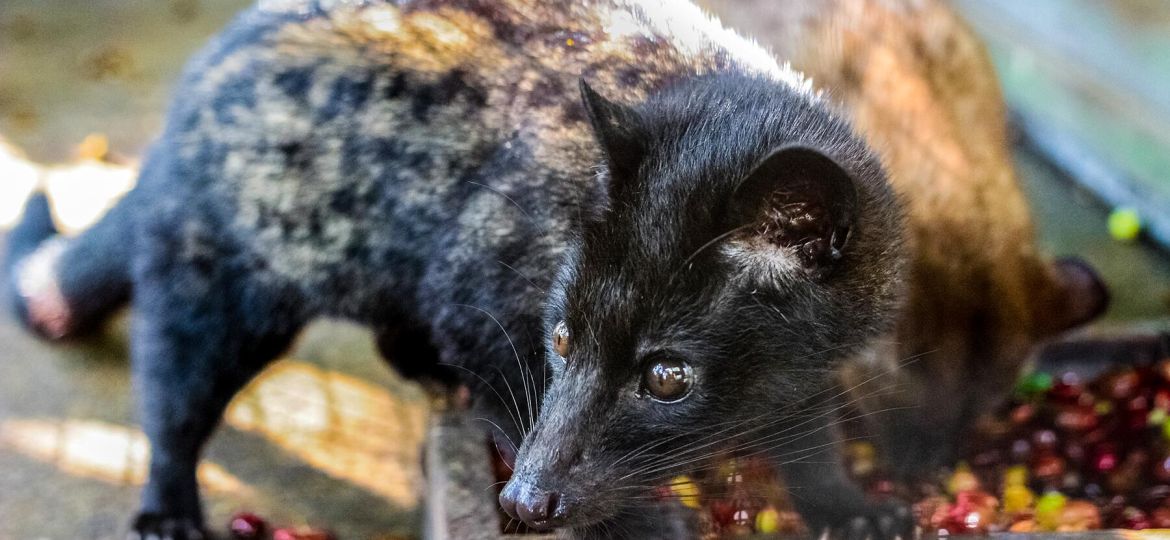
Coffee enthusiasts and the curious alike often marvel at the world’s most unique brews. Among them, coffee derived from animal feces stands out. This article delves into the intriguing process behind this unusual coffee production method, spotlighting the creatures responsible and the ethical debates it sparks.
What Animal Poops Coffee Beans?
The primary creature behind this phenomenon is the Asian palm civet. These animals consume ripe coffee cherries, and through their digestive process, ferment the beans, which are later collected from their feces. This process is believed to enhance the coffee’s flavor profile, creating the renowned Kopi Luwak.
However, civets are not alone in this; coatis, jacu birds, and elephants also partake in creating similar coffee varieties, each adding a unique touch to the beans they process.
Key Takeaways
- Civet Coffee’s Prominence: Kopi Luwak, produced by the Asian palm civet, is the most well-known animal poop coffee. Originating from Indonesia, it’s a luxury item in the coffee world, praised for its unique creation process and flavor.
- Diverse Animal Contributions: Beyond civets, other animals like coatis in Peru, jacu birds in Brazil, and elephants in Thailand contribute to this niche coffee market. Each species offers a distinct fermentation process, influencing the coffee beans’ flavor.
- Ethical and Welfare Concerns: The production of Kopi Luwak raises significant ethical issues, particularly regarding the treatment of civets. Often kept in captivity under poor conditions, the welfare of these animals is a pressing concern, prompting calls for ethical sourcing and certification.
- Taste and Quality Debate: While some aficionados laud the smooth, less acidic flavor of Kopi Luwak, others question its superiority. The debate extends to the coffee community, where the balance between novelty and taste quality remains a topic of discussion.
- Imitations and Certifications: Given Kopi Luwak’s high demand and price, imitations have surfaced. To combat this, certification processes have been established, ensuring authenticity and addressing ethical concerns surrounding animal treatment.
The Process of Making Kopi Luwak
Kopi Luwak’s unique production begins with the Asian palm civet consuming ripe coffee cherries. Inside the civet’s digestive tract, enzymes alter the structure of the coffee beans, which are later excreted.
Workers collect these feces, clean the beans, and then process them further to create coffee. This natural fermentation process is believed to reduce bitterness and enhance flavor, making Kopi Luwak a sought-after delicacy.
Other Animals Contributing to Poop Coffee
Beyond civets, several other animals contribute to this niche coffee segment. Coatis in Peru produce a similar coffee by digesting cherries, akin to the civet’s process.
In Brazil, the Jacu bird’s dietary habits yield a unique coffee variant, while in Thailand, elephants participate in creating Black Ivory Coffee. Each animal’s digestive process offers a distinct flavor profile to the coffee beans.
Ethical Considerations and Animal Welfare
The production of Kopi Luwak has sparked significant ethical debates, primarily concerning the welfare of civets. Often kept in cramped, unsuitable conditions, these animals suffer for the sake of coffee production.
Similar concerns apply to other animals involved in this industry. Ethical sourcing and certifications are crucial in addressing these issues, guiding consumers toward more humane choices.
Taste, Quality, and Consumer Perceptions
While Kopi Luwak is celebrated for its unique flavor, the coffee community remains divided. Some enthusiasts appreciate its smooth, less acidic taste, while others question its superiority over traditionally processed coffees.
The perception of taste is subjective, and while some find the backstory of Kopi Luwak appealing, others prioritize flavor and ethical considerations.
Market and Imitations
The rarity and unique production method of Kopi Luwak contribute to its high market price. However, this has also led to the emergence of imitations, with some producers attempting to replicate the digestive process artificially.
Consumers seeking authentic Kopi Luwak should look for certifications, ensuring they support ethical practices and receive genuine product.
FAQs
How much does Kopi Luwak cost per pound?
Kopi Luwak is among the most expensive coffees globally, with prices varying significantly based on authenticity and sourcing. Farmed Kopi Luwak might range around $100 per pound, while wild-sourced beans can reach up to $600 per pound due to their rarity and the labor-intensive collection process.
Is there cat poop in regular coffee?
No, regular coffee does not contain cat poop. Kopi Luwak, specifically produced through the digestive process of the Asian palm civet, is the coffee known for its unique production involving animal feces. Regular coffee is processed traditionally without any such involvement.
Do bats eat coffee beans?
Yes, in some regions, bats consume coffee cherries, and their digestive process can influence the coffee beans, somewhat akin to the civet’s impact on Kopi Luwak. However, bat-processed coffee is far less common and not as widely recognized as Kopi Luwak.
How was coffee originally made?
Coffee’s origin traces back to Ethiopia, where legend suggests a goat herder named Kaldi discovered its energizing effects after his goats ate coffee cherries. The first methods of coffee preparation involved roasting and boiling the beans, evolving over centuries into the diverse brewing techniques we see today.
Final Thoughts
The allure of Kopi Luwak and other animal-processed coffees lies in their unique production stories and distinctive taste profiles. However, the ethical and environmental implications of these coffees are significant considerations. Prospective consumers should weigh the novelty and taste against the welfare of the animals involved and the ecological impact.
For those interested in exploring these coffees, it is crucial to seek out ethically sourced products, ensuring the welfare of the animals and the authenticity of the coffee. Certifications and transparent sourcing can guide consumers toward making informed and responsible choices in the intriguing world of animal-processed coffees.









